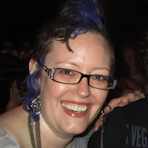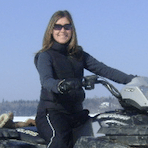
MaryAnne Brown
 MaryAnne and her sisters, Emilie and Megan, in Las Vegas (July 2011)
MaryAnne and her sisters, Emilie and Megan, in Las Vegas (July 2011)
Age: 39
Hometown: Vancouver, BC
What was your diagnosis? Bilateral breast cancer: ductal invasive carcinoma (left breast) and lobular invasive carcinoma (right breast) one positive lymph node on the right side
What school do you attend? I am a master’s student in sociology at UBC, but I’m transitioning into the Jack Bell School of Social Work at UBC, and also considering an art therapy degree from the Vancouver Art Therapy Institute.
What is your career goal? I really want to support young adults with cancer! I want to use my (future) social work and art therapy degrees to develop support options for young adults.
What is/was your occupation? Student. Hopefully not forever!
Your cancer experience
What led to your diagnosis?
My little sister, Megan, was diagnosed with breast cancer at age 27 in 2008 and my mum had been diagnosed at age 42 in 1992. The doctors recognized that it was likely genetic, so we all got tested. My sister, Emilie, tested negative, but Megan, Mum and I all tested positive for the BRCA2 gene mutation. I was diagnosed as BRCA2 positive in January of 2009, found a lump in my left breast in February of 2009, and was diagnosed with bilateral breast cancer in March of 2009. What a rollercoaster!
What year was it? What was your age at the time?
It was March of 2009; I was 35.
In which hospital(s) are/were you treated?
I had surgeries at Mount Saint Joseph’s, VGH, and UBC Hospitals. I received chemo and radiation at the BC Cancer Agency.
At what level of education were you at diagnosis?
I was one term into my Master’s of Sociology at UBC. I had previously done a Women’s Studies bachelor’s degree with a Queer Studies minor.
What were your first thoughts when diagnosed?
I was just in complete and total shock. I was still trying to wrap my head around my sister’s breast cancer diagnosis, and my BRCA2 diagnosis. At the time, I was trying to decide whether or not I should have a prophylactic mastectomy. For whatever reason, even with all of the evidence that it was a distinct possibility, I still didn’t expect to get cancer, myself.
How did your family react?
I think my family was as shocked as I was. They were all still reeling from the news of my little sister. It really hit us all hard to hear my diagnosis. It was scary. And we all live quite a ways away from each other. My parents are in Alberta and my siblings all live in the states, so we couldn’t even really be together for longer than short visits through this whole thing. It was hard.
How did your friends react? Were you treated differently, or did things remain the same?
I did have a friend who couldn’t handle it. But I can really understand because she had lost her dad to cancer only 4 years previously. She tried so hard to be there for me and even went to some workshops with me. But it proved too intense for her and she dropped out of the picture. It hurt at the time, but we are slowly rebuilding our relationship now. I can really forgive her because I know she was in a lot of pain and just didn’t know how to handle it.
I have another core group of friends who were just amazing. They each used their own personal talents and jobs to take care of my husband and I during my treatment by giving us things like free massages and free haircuts (well, for my husband, who still had hair!) They didn’t just say the usual, “let me know if I can help with anything”. They offered us concrete things like dinners and movies and company. I adore them. I am just so grateful for them all!
What did your treatment consist of?
I had bilateral sentinel node biopsies and lumpectomies, then six months of chemo (doxyrubicin, cyclophosphamide, paclitaxel) and one year of herceptin, then 25 radiation treatment sessions, then bilateral mastectomy/latissimus reconstruction, then two separate surgeries to deal with infections caused by my expanders. Because of the infections I was unable to finish my reconstruction. I am now waiting for DIEP reconstruction. I need to lose weight to become a better candidate for it, and I also need to be more emotionally ready to undergo that. It’s a 13 hour surgery with up to 12 weeks of recovery afterward. I really want to finish my reconstruction because things feel really unfinished, but I’m also just not ready for such a big surgery again. This past year, I also got my ovaries out because being BRCA2 positive increased my chances of ovarian cancer. It also helps prevent a breast cancer recurrence. I had two years of tamoxifen (estrogen blocker) and just started letrozole (an aromatase inhibitor).
What is your current medical status?
I am in remission. I’m not even sure what my remission date is. I guess if you count my mastectomy as my date, then I will have been in remission for three years in March of 2013. How is life different for you now post diagnosis? My priorities have changed so much! My biggest goal is to be happy. Before cancer I was pretty achievement oriented. Success was important to me. Now I just want to be happy and live well. I don’t want to spend the rest of my life working my butt off. I want to travel and write and dance and sing and craft and laugh and spend every day with my dear husband and my friends.
What is/was the toughest part of your challenge?
The toughest part of this journey for me is that my sister, Megan’s cancer came back and she is now metastatic. Her doctor has said that she is terminal. She lives in an area that does not have much in the way of support for young people. She does not really have contact with anyone who could help her feel less alone in her situation. She is scared and isolated. It breaks my heart that her cancer was caught much later than mine. She was nursing her little girl at the time, and doctors just thought she had mastitis. She saved my life. Because of her diagnosis, my doctors took my lump seriously. I wish there was so much more I could do for her. I know my whole family feels pretty powerless about this.
UPDATE: My sister, Megan, passed away from complications due to her breast cancer treatment in April 2013. She was 31. We all miss her terribly, but I know that her husband and young daughter miss her even more. Cancer sucks!
What was the best lesson you took away from your challenge?
When I discovered YACC and Callanish, I learned that I really wasn’t alone in this crazy journey. I began to understand that I deserved to pursue joy in my life. That it wasn’t selfish to make happiness my main goal. I didn’t understand that before. I measured my worth by my achievements.
YACC and Callanish have become my community, a place where I am deeply supported and can give that amazing support to others as well. I still struggle with the achievement obsession sometimes, but the experience of being so unconditionally accepted by YACC and Callanish has changed me. Instead of spending a lot of time and energy trying to fit in wherever I go, I just go to the places where I know I belong.
What really motivated you to keep going while you were sick?
YACC and Callanish and my darling husband of nearly 20 years and amazing friends and lots of inspiring quotes hanging on my walls at home. The one quote that really kept me going was by Jon Kabat-Zinn: “As long as you are breathing, there is more right with you than there is wrong.”
What are your thoughts and feelings about your illness now?
I’m rather surprised at how I’ve grown to be okay with this whole journey. I know it’s clichéd, but there is a part of me that is grateful for all of this. I’m not sure what else could have slowed me down enough to help me see that I wasn’t happy with the direction I was going in my life. In spite of the challenges and the deep sadness and grief over my sister’s advancing illness, I am happy. I am able to show up for all of this. I’m grateful for that.
What are some preventative measures that people can take to lower their risk of having an experience like yours?
Because my cancer was genetic, I’m not sure how to answer that one. If you have multiple people in your family who’ve had breast cancer, and especially if you’ve also had family members who’ve had ovarian cancer, talk to your doctor about screening options.
Did you attend any support groups during your challenge?
I tried a couple of regular adult breast cancer groups at first and found it to be so disheartening. They just couldn’t relate to me and I couldn’t relate to them. They were sad to see me there because I was so much younger, and I found myself comforting them. So not helpful! Then I discovered YACC and eventually Callanish. I’ve been attending YACN at Callanish ever since, and if YACC had a local support group in Vancouver, I would attend that faithfully too! Young adult support groups are the bomb!
How are you connected with Young Adult Cancer Canada?
I found out about YACC through the BC Cancer Agency. I feel SO GRATEFUL to have discovered YACC because my life has truly changed from that moment on. I don’t even totally understand it, but my retreat in 2009 set me on a different path, and I have been a happier person ever since. I also made friends at that retreat that I know will be life-long friends.








